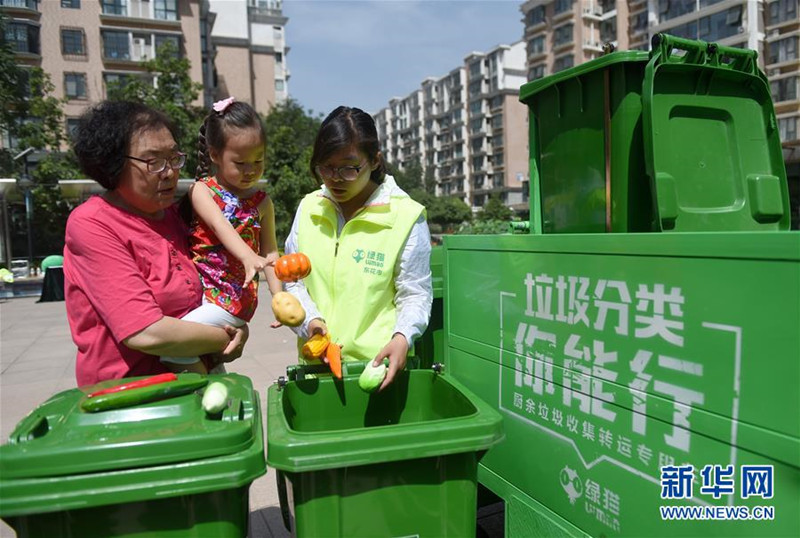Zero-waste lifestyle begins to take hold
- By Cui Can and Wu Jin
 0 Comment(s)
0 Comment(s) Print
Print E-mail China.org.cn, August 18, 2019
E-mail China.org.cn, August 18, 2019
The concept of zero waste, the conservation of all resources by means of responsible production, consumption, reuse and recovery of products, packaging, and materials without burning and with no polluting discharges to threaten the environment or human health, is playing its important role in helping people to recycle everything they use in their daily lives.
This kind of concept has been long discussed when it comes to the challenging issue of garbage sorting and disposal, offering a set of principles focused on waste prevention by promoting reusability in every form of production.
Every year, official statistics show that about ten billion tons of solid waste are generated in China by people and various industries. Such an inconvenient truth poses a national burden, yet at the same time to helps raise awareness.

To tackle such challenges, China has been trying to promote new waste sorting rules in cities for many years to encourage recycling. In March 2017, the State Council issued a plan for new legislation and a standard waste-classification system, aiming to achieve a recycling rate in 46 major cities of at least 35% by 2020.
Wang Yanhui, operations director of Innovative Green Development Program (iGDP), said that to reach such a goal, a work plan for the "zero-waste city" pilot program passed last December is drawing wide attention.
According to the plan, a zero-waste city refers to an advanced urban development and management model aiming to promote a green lifestyle, minimize the amount of waste produced, strengthen recycling programs and ensure that any waste released into the environment is harmless.
A total of around 10 cities will be selected as the initial program pilots.
"Residents have insufficient knowledge of how to classify plastic waste," Wang said. "The channels for recycling, use of recyclable plastics, and general knowledge of zero-waste lifestyle must be improved."
Su Yiyun, project manager in Beijing Social Organization Resources, is working to raise public awareness of waste classification and promote a zero-waste lifestyle.
In 2016, her team launched a waste-sorting project in Zhaojialou, a community in Beijing's Dongcheng District. By carrying out promotional campaigns on waste-sorting, traveling door-to-door to teach residents how to reduce waste, sort it, recycle and reuse, about 300 people in the community got the chance to become familiar with general knowledge on waste sorting.
In addition, every household was issued a "green card" through which it receives points for correctly collecting and sorting kitchen waste that can be exchanged for household goods.
"There is no such thing as waste, only resources we haven't found out how to reuse yet." Su said.
Urban garbage sorting is just part of the environmental protection campaign that is endeavoring to reduce pollution resulting from the bulky size of unsorted waste buried or incinerated in unscrupulous ways.
In addition, the efforts to categorize waste for different treatments are also extending to rural areas which constitute another part of the campaign, though, with a different story.
Having to spend four hours on a single trip shuttling between Huilongguan, one of Beijing's most populous urban communities, and Babaotang Village, located north in the city's rural Huairou District, Chen Simin, the program manager of iGDP, spent a lot of time worrying what sort of challenge would be posed in introducing an environmental protection program in an outlying country district surrounded with mountains.
Most villagers there are above 40 years old, few have received an education higher than primary schooling and some of them are disabled, Chen expounded on her first impression of the locals.
To her surprise, the local people, despite their supposedly less cultivated background, coordinated well with her program.
"They call me Xiao ["little"] Chen and greeted me each time I got there, and cooperated well in our specified training programs," she recalled.
Among the 38 village households, a senior man who had lost his speaking and listening abilities sorted all the waste correctly the first day the program was launched. Later, an increasing number of the locals got used to sorting and throwing waste into the correct containers with Chen's on-the-spot assistance.
Moreover, as local villagers have been encouraged by the credits granted for their correct garbage sorting, about 80 percent local waste had been categorized appropriately by early August.
However, the ensuing process on how to deal with the categorized rubbishes in different containers arouses some concern from the residents, who are afraid their efforts might end up in vain.
"We seek to ensure them by showing that there are two different groups of trucks designated to transport different waste," Chen said.
China is considering to spread trash-sorting efforts from the pilot city of Shanghai to the rest of the country within a couple of years to deal with the imminent threat posed by ballooning landfills and carcinogenic dioxin releases.






Go to Forum >>0 Comment(s)